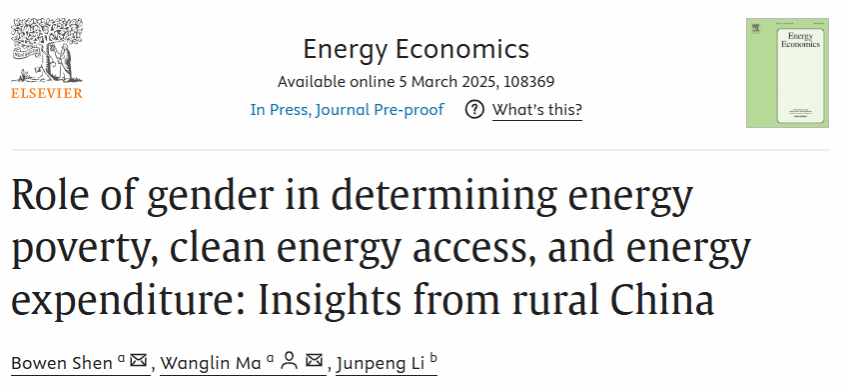近日,云南农业大学国际学院中新合作办学农林经济管理专业2019级本科生,沈博文在林肯大学攻读科研型硕士(Research Master)学位期间,在能源经济学领域国际顶级期刊《Energy Economics》发表了题为“性别在决定能源贫困、清洁能源获取和能源支出中的作用:来自中国农村的证据”的论文。该期刊2025的影响因子(Impact Factor)为13.6,在Scimago期刊排名中位列Q1区,在ABDC Journal Quality List 排名A*。沈博文同学的主要指导老师为Wanglin Ma 教授。

全文获取链接:

沈博文同学在圆满完成林肯大学与云南农业大学合作办学的“3+1双学位”项目后,继续深耕学术之路,选择攻读林肯大学的科研型硕士学位,并预计于2025年底顺利完成学业。
中文摘要:
性别从根本上形塑了个体资源获取和经济表现的路径,构成了缓解农村能源贫困与推进能源转型的先决条件,是乡村振兴顺利实现的关键因素。然而,关于性别在农村能源贫困和能源转型中的具体作用尚未得到充分研究。为此,本研究系统考察了中国农村家庭户主性别在能源贫困、清洁能源采用和能源支出方面的差异。具体而言,本研究采用多维能源贫困指数(MEPI)全面评估了中国农村家庭的能源贫困水平,并利用外生转换处理效应模型分析了从中国东中西部地区典型省份(江苏、湖北和云南)调研的1485户农村家庭样本数据。主要结果表明:男性户主家庭的MEPI指数较女性户主家庭显著降低23%。此类家庭采用清洁能源满足炊事/取暖需求的概率高出34%,取暖能源支出额度增加27%。异质性分析进一步揭示家庭规模对能源贫困和支出的性别差异具有调节作用:6人及以上的大家庭(无论户主性别)陷入能源贫困的风险比小规模家庭降低18%,且清洁能源获取概率提高21%。以上结果印证了性别并非中立于农户能源贫困的发生和能源消费。基于此,本研究认为:政策干预需重点着力于提供定向技能培训、小额信贷计划和能源补贴以赋能农村女性(尤其是针对小规模家庭)。借此,农村女性能够平等地参与家庭能源使用决策,这将最终有助于减少能源贫困并加速清洁能源的普及。
英文摘要:
Gender shapes individuals' resource access and economic performance, serving as a prerequisite for rural energy poverty reduction and energy transition — two central tasks of rural development. However, the role of gender in determining rural energy poverty and energy transition has not been properly explored. This study explores gender differences in energy poverty, clean energy access, and energy expenditure among rural Chinese households. We employ the multidimensional energy poverty index (MEPI) to capture household energy poverty comprehensively. An exogenous switching treatment regression model is applied to analyze survey data of 1485 rural households from eastern, central, and western China (Jiangsu, Hubei, and Yunnan provinces, respectively). The results show that rural households with male heads have a lower level of MEPI than those with female heads. Relative to rural households with female heads, those with male heads are more likely to access clean energy for cooking and heating and spend more on energy for heating than those with female heads. The disaggregated analyses reveal that large-sized households, regardless of male or female household heads, tend to have a lower MEPI and higher probability of accessing clean energy for cooking and heating than medium- and small-sized households. Our findings highlight that gender is not neutral when determining household energy poverty and use patterns. There is a great need to empower rural women (especially those in small-sized households) by offering them skills training, financial support, and energy consumption subsidies. By doing so, rural females can be equally involved in making household decisions in energy use activities, which would eventually help reduce energy poverty and promote clean energy use.
